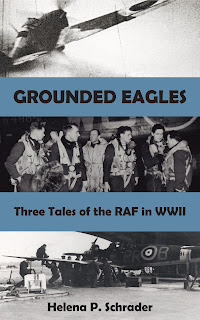"A Stranger in the Mirror" that looks at the fate of one of the secondary characters in "Where Eagles Never Flew." After being shot down in September 1940, Pilot Officer David "Banks" Goldman wakes up in hospital. He has been so severely burned that only a series of plastic surgery operations can recreate a human face. "A Stranger in the Mirror" follows his journey through eighteen months of reconstructing his face and his identity.
Excerpt 1:
"All I wanted was for her to smile at me," Banks defended himself. "Just one smile."
"Isn't my smile pretty enough for you?" The matron answered, her facing lighting up for him.
Banks appreciated the effort, but he felt shattered nevertheless. "I want to see a mirror."
"No, you don't," the matron countered. "It's too soon."
"It's my face. I have a right to see it."
"This isn't about your civic rights, young man. It's about what is best for your recovery."
"You think seeing my own face will have an negative impact on my recovery?"
"Yes, I do."
Banks thought about that. His face was so hideous that it made women sick just look at him, and his hands would never be strong enough for him to fly again. He had no future. Why on earth was he enduring all this pointless pain? "Can't you put me out of my misery?"
"A Stranger in the Mirror" opens with David "Banks" Goldman already in the Queen Victoria Cottage Hospital in East Grinstead, where the worst burn cases were treated by the soon-to-be legendary New Zealand plastic surgeon Dr. Archibald McIndoe. The obvious problem is that David has been severely burned after his Hurricane caught fire in a dogfight with an Me109. But David's identity crisis in only partly physical.
David was born in Germany and lived there for the first 13 years of his life. His family is Jewish and as the Nazis gain in popularity, David is subjected to ridicule and hostility, but he also has good friends who stand by him. Even as the family emigrates to Canada in late 1933, David's feelings toward Germany are confused. Seven years in Canada cannot change that. He hates the Nazis, but not Germany or all Germans. When he comes to the UK to join the RAF in 1940, it is to fight the Nazis who, he feels, are destroying his beloved country. Yet in England his identity is more confused than ever: he is a German Jew with a Canadian passport living among the British -- and not at all sure where he belongs.
David has another problem as well. His distant yet domineering father has long considered him a failure -- the son who didn't do well at school, the son who didn't get into college. David's passion for flying provokes only contempt from a father who views flying as a 'hobby' not a profession, and calls airline pilots 'glorified bus drivers.' But for David, flying has been his greatest passion, his joy, and his identity. And the doctor is telling him he may never fly again.
Excerpt 2:
"Fly? You can't mean you want to go back to being just a pilot?" His brother-in-law Clive exclaimed. "I would have thought you'd be beyond that 'fly boy' stage."
His father wouldn't have been able to say it better, Banks thought resentfully, and answered stubbornly. "No. Sorry to disappoint. I'm still in that 'stage,' as you put it. I very much hope to be passed fit for flying."
"But David!" [His sister] Sarah burst out. "Why? It could all happen again! Why risk it?"
"Because, in case you haven't noticed, we're still at war with Nazi Germany. Indeed, we're barely holding our own, and the RAF is the most important component in the fight."
"No question about that, old boy," Clive chimed in. "But I don't think anyone alive would question that you've already done your part. As Sarah said, why take more risks? There are lots of other ways to contribute to the war effort?"
"My ambition is to become an instructor at Training Command," Banks admitted.
"Well, that's a little better," Clive admitted, before adding, "and yet, there are a tremendous number of flying accidents. It would be a terrible tragedy if, having survived what the Luftwaffe did to you, you died because some student pilot made a stupid mistake. Why not consider something totally different?"
"Such as?"
Intelligence. With your language skills, you would be invaluable."
Banks made a non-committal reply and they left it at that.
David "Banks" Goldman re-appears as an important character in "Bridge to Tomorrow" -- a series set against the backdrop of the Berlin Airlift.

they took the war to Hitler.
Their chances of survival were less than fifty percent.
Their average age was 21.
This is the story of just one bomber pilot, his crew and the woman he loved.
It is intended as a tribute to them all.
or Barnes and Noble.
 "This
is the best book on the life of us fighter pilots in the Battle of
Britain that I have ever seen.... I couldn't put it down."-- RAF Battle
of Britain ace, Wing Commander Bob Doe.
"This
is the best book on the life of us fighter pilots in the Battle of
Britain that I have ever seen.... I couldn't put it down."-- RAF Battle
of Britain ace, Wing Commander Bob Doe.
Winner of a Hemingway Award for 20th Century Wartime
Fiction, a Maincrest Media Award for Military Fiction and Silver in the Global Book Awards.
Find out more at: https://crossseaspress.com/where-eagles-never-flew
For more information about all my books visit: https://www.helenapschrader.com


.jpg)

No comments:
Post a Comment